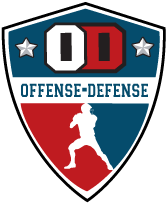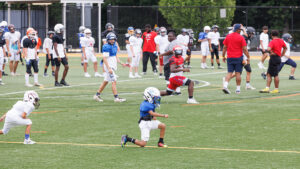High school football players have a multitude of questions about the college football recruiting process. They often wonder when to start, what eligibility requirements are necessary, and how to get noticed by college coaches. Understanding the distinctions between NCAA divisions and which colleges to target is also a common concern. Players seek guidance on how to create a compelling recruiting profile and navigate official and unofficial visits. They may inquire about the role of their high school coach, recruiting rules, and the various stages of recruitment, including the letter of intent. Addressing the importance of academics, dealing with injuries, and balancing academics and football in college are also key concerns. By finding answers to these questions, high school football players can approach the recruiting process with greater confidence and make informed decisions about their athletic futures.
High school football players often have numerous questions about the college football recruiting process as they aspire to continue their athletic careers at the collegiate level. Some common inquiries may include:
When should I start the recruiting process? High school athletes wonder when it’s appropriate to begin thinking about college football recruitment and when they should start reaching out to coaches.
What are the eligibility requirements? Players may want to know about academic and athletic eligibility criteria, such as GPA, standardized test scores, and core course requirements.
How do I get noticed by college coaches? This question often revolves around strategies for gaining visibility and impressing recruiters, such as attending showcases, sending highlight reels, or participating in camps.
Which colleges should I target? Players often seek guidance on how to identify schools that are a good fit for their skill level, academic goals, and personal preferences.
What is the role of my high school coach in the recruiting process? Understanding how their high school coach can support their recruiting efforts and provide recommendations is essential.
What is the difference between Division I, II, and III schools? Many players are unfamiliar with the distinctions between NCAA divisions and may need clarification on the level of competition and scholarship opportunities.
How do official and unofficial visits work? Students may have questions about the logistics of campus visits, including who pays for them and what to expect during the visit.
What should I include in my recruiting profile? Players often seek advice on creating a comprehensive recruiting profile that showcases their abilities, stats, and accomplishments.
When can coaches contact me, and when can I contact them? Understanding the NCAA’s recruiting rules and timelines is crucial for high school players.
What should I expect during the recruitment process? Athletes may want to know the various stages of recruitment, including offers, official visits, and the signing process.
How important are academics in the recruiting process? Recognizing the significance of academic performance and how it affects recruitment prospects is a key concern for student-athletes.
What is a letter of intent, and when do I sign it? Players may wonder about the commitment letter and when it becomes binding.
What if I get injured during the process? Understanding the implications of injuries and how they might impact recruitment is important for players.
What if I don’t receive any offers? High school athletes often worry about not getting any offers and may want to know about walk-on opportunities and alternatives.
How can I balance academics and football in college? Recognizing the challenges of being a student-athlete and finding the right balance between classes and athletics is a concern for many players.
By addressing these questions, high school football players can navigate the college football recruiting process more confidently and make informed decisions about their future in the sport.













